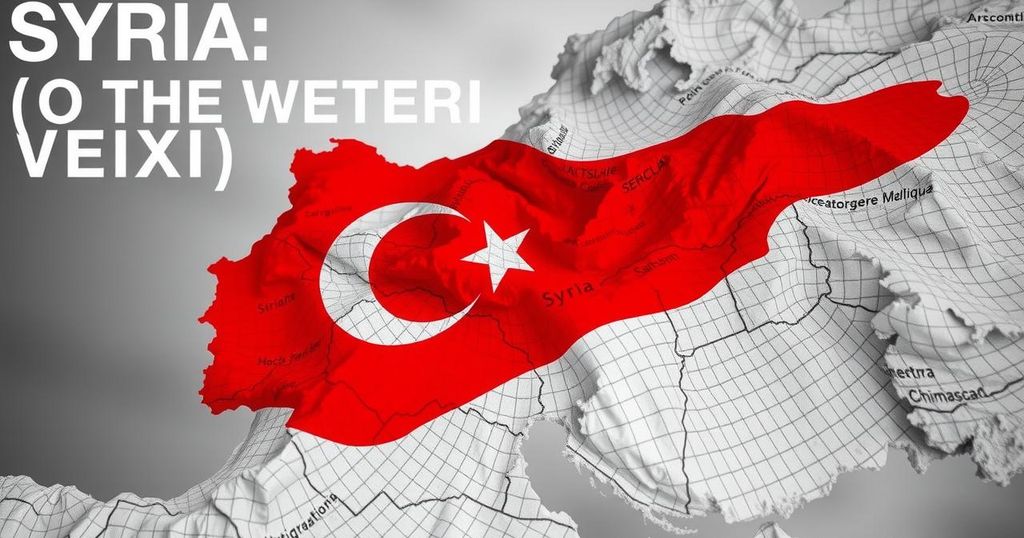Global news
ASIA, ASSAD, BASHAR AL - ASSAD, DAR, DARIA ISACHENKO, DEMOCRATIC UNION PARTY, EUROPE/ASIA, FIGHTER JETS, FOREIGN POLICY, FOUNDATION FOR DEFENSE OF DEMOCRACIES, HEZBOLLAH, INTERNATIONAL RELATIONS, ISACHENKO, KIAN SHARIFI, LEVANT, MEDITERRANEAN SEA, MIDDLE EAST, PEOPLE ’ S PROTECTION UNITS, REFUGEE CRISIS, RUSSIA, SYRIA, SYRIAN CONFLICT, SYRIAN DEMOCRATIC FORCES
Leila Ramsay
0 Comments
Turkey’s Ascension Over Iran’s Influence in Syria: An Analytical Overview
Turkey has emerged as the leading foreign influence in Syria, succeeding where Iran’s role has diminished, especially following the decline of Assad’s regime. Turkey’s focus targets Kurdish factions, refugee management, and establishing stronger geopolitical ties, while Iran seeks to retain influence amid shifting allegiances. Their interplaying dynamics reflect essential regional tensions that could influence broader conflicts in the South Caucasus and beyond.
Recent developments have positioned Turkey as the principal foreign influence in Syria, significantly diminishing Iran’s longstanding role, especially following the faltering authority of Bashar al-Assad. While Turkey has historically aligned with rebel factions, Iran has relied on Assad to maintain its strategic foothold and facilitate operations through proxies like Hezbollah. Experts suggest that despite Turkey’s ascendance in Syria, this shift may not drastically alter the overall dynamics of Turkey-Iran relations, as both countries possess overlapping interests, such as countering shared adversaries, including Israel.
Turkey’s focus encompasses several priorities in Syria: addressing the Kurdish presence through groups such as the People’s Protection Units (YPG), facilitating the return of Syrian refugees, and managing future refugee inflows into its territory. The recent power shift in Syria introduces Hayat Tahrir al-Sham and its affiliates into the governance equation, complicating Turkey’s position further. They could potentially enhance Turkey’s leverage in the Mediterranean if cooperative maritime agreements are pursued with the newly proposed Syrian authorities.
The implications of Turkey’s expanded role could resonate with broader geopolitical landscapes, particularly in the South Caucasus, where competition among Turkey, Iran, and Russia remains intense. Although formal collaboration has diminished, bilateral dialogues concerning conflict management and regional stability cannot be entirely dismissed. As noted by experts, the existence of shared adversaries could foster some level of cooperation between Turkey and Iran, notwithstanding their rivalry.
Nevertheless, Iran may strive to reassert its influence, employing proxies to contest Turkish interests in Syria, with the Islamic Revolutionary Guards Corps likely seeking ways to regain weakened footholds in the region. Additionally, the support of U.S. forces for Kurdish-led entities remains crucial amidst diminishing American involvement, yet the ongoing complexities enhance the vulnerabilities faced by these groups in light of the shifting environment in Syria.
Turkey’s position may complicate matters for the Kurdish groups like the SDF, impacting their autonomy unless they forge alliances with emerging power players like HTS, which seeks a unified representation of all armed factions in Syria, possibly at the expense of Kurdish political ambitions.
Turkey’s escalating dominance in Syria arises from the longstanding civil conflict that began in 2011. While Iran and Russia offered steadfast support to President Assad, Turkey backed various rebellious factions that opposed his regime. The Iranian strategy hinged on Assad’s survival to facilitate military and logistical endeavors across the region through allies like Hezbollah. Conversely, Turkey harbored aspirations for a more favorable Syrian governance structure, particularly concerning Kurdish politics, which directly threatens its national security. As the internal dynamics evolve, the ambitions and influences of these regional powers contending for control in Syria intensify, impacting neighboring geopolitical relations.
In conclusion, the shifting dynamics in Syria highlight Turkey’s ascendance as a key foreign player while Iran’s influence wanes. Turkey’s strategic objectives revolve around countering Kurdish forces, managing refugee flows, and solidifying its presence in the region. Concurrently, potential alliances and confrontations will shape the future landscape, particularly with respective interests diverging and converging. Iran’s efforts to reassert its influence amidst these changes signal a complex geopolitical environment that demands careful navigation from involved powers. Historically competitive relations between Turkey and Iran might experience a recalibration rather than a complete rupture, reflecting a nuanced interaction among regional adversaries.
Original Source: www.eurasiareview.com




Post Comment